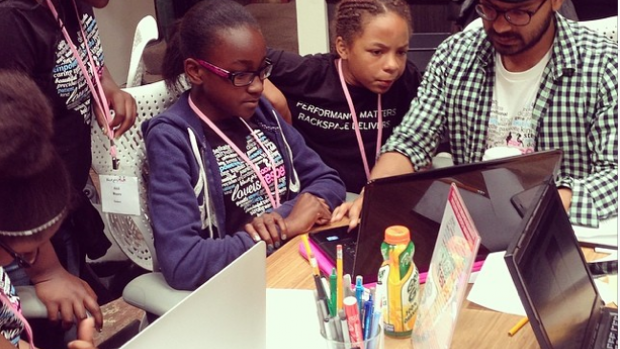Black Girls Code: Helping Themselves to Help Others

On Day Two of the Black Girls Code (BGC) “Love is Respect” Hackathon, dozens of adolescent girls ping-ponged between Rogers Hall and Pfizer Auditorium. Partnered with Verizon and Break The Cycle, an organization dedicated to empowering youth to end domestic violence, BGC hosted the first in series of app-building competitions meant to expose African-American girls to the world of STEM (science, technology, engineering and mathematics)—a community in which they are vastly underrepresented. The competition, themed around educating young people on what makes for healthy and unhealthy relationship, performed double duty in introducing the girls to a new potential career field and giving them the opportunity to educate themselves and others on an issue also affecting their peers.
“With this program,” said Donna Knutt, a BGC volunteer, “[the girls] are helping themselves to help others. And there are no barriers. It’s come as you are.”
For this competition, there were 17 teams composed of three to four girls, ranging in ages from 10 to 17, most with little to no exposure to software development. Each team has access to adult facilitators/mentors with various backgrounds.
Day One of the hackathon comprised of the brainstorming, or ideation, phase. Day Two was devoted to building the actual app and preparing for a group presentation the teams would pitch before their peers, parents and supporters, and a panel of judges.
Quiessence Philips, a BGC volunteer with a background in cyber security, observed that although the stages of software development were new concepts for most of the girls, it wasn’t their biggest obstacle.
“The most challenging thing for the girls,” Philips said, “was that learning curve of working within a group.
Back in Rogers Hall, the weekend’s design headquarters, a member of Team NKJT, a group of bright-eyed, grinning 10 year olds, confirmed Philips’ observation.
“The hardest thing was coming to a conclusion because we all wanted to add pieces to the game. That was the hardest part. Trying to take a piece of everybody’s idea and merge everything together.”
Team NKJT settled on an app modeled after the popular game “Subway Surfer” but incorporated a quiz element used to evaluate how people are doing in various relationships and suggested ways to make improvements on them.
Each of the four classrooms-turned-design-hubs housed teams intensely planning, designing and preparing for upcoming practice presentations and, ultimately, the main (pitching) event. Some participants even skipped socializing during lunch and worked between bites of food from paper plates positioned beside whirring laptops.
In each room, minds were churning, thoughts were being exchanged, ideas were becoming reality and, in keeping with the theme of the hackathon, it just so happened that the tenets of positive relationship building were being put into practice.
Amidst a backdrop of rainbow-scribble whiteboards and walls papered with post-its, the girls of Team Love 4 Life prepped and encouraged one another for their upcoming pitch and fine-tuned a slide show, as their mentor Wayne Warner, an African-American front-end developer and first-time BGC volunteer, looked on.
“They definitely gained experience thinking through a project, brainstorming, getting ideas on paper, all the way down to something they can build,” said Warner who went on to say why he wanted to take part in the event.
“[The lack of diversity] is a problem in the industry. I walk around I see it every day. Nobody else looks like me. And nobody looks like anyone in this room, more specifically,” Warner said. “I’m happy to be a part of the solution.”
And those presentations the girls were hard at work preparing?
“The event was very inspiring. The girls were very engaged,” said DeAngela Duff, Co-Director of Integrated Digital Media at the NYU School of Engineering. “During their demos, the level of poise, confidence, and knowledge the girls exhibited rivaled many adult presentations.”
Judging by the energy of all the participants, volunteers and organizers of the BGC “Love is Respect” Hackathon, the future of African-American women in STEM looks pretty promising.
Go girls.




